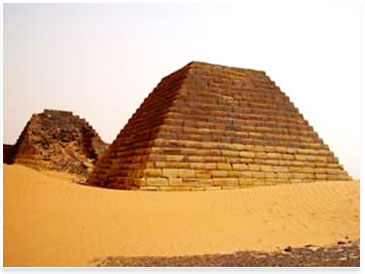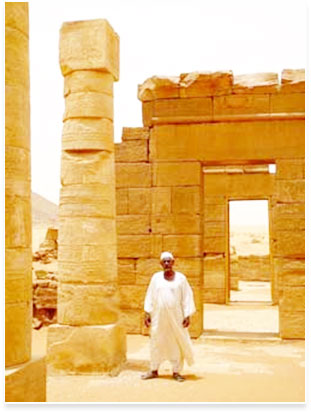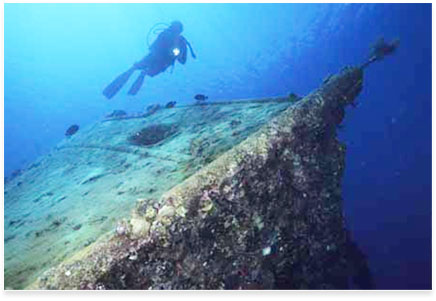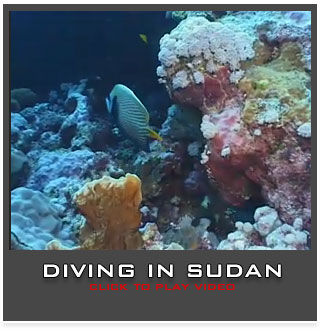NOVA SUDAN TOURS Nova Airlines
NOVA SUDAN
TOURS
Nova Airlines in cooperation of several
Domestic and International Travel agents and Tour Operators, offer a wide range
of Sudan Tour all year around.
We are connected with all the major and reliable tourist company around the
world, their competence and professionalism will guarantee you a nice and easy
holiday in Sudan.
Following we just give you an idea about what you can do in Sudan, we are ready
to give you the name list of our partners located in your area, simply send us
your request
sudan.tours@novaairways.com
LAND TOUR (example 1)
Day 01: Arrive Khartoum
Arrival in Khartoum, meeting and assistance at the airport and transfer to
hotel, overnight.
Day 02: Khartoum
After breakfast citytour in Khartoum and visit to the National Museum
housing the salvaged temples of Upper Nubia and the frescoes from the cathedral
of Faras. Afterwards proceed to the Ethnographical Museum. Lunch in a restaurant
by the Nile, (optional) afterwards motor boat trip to the confluence of Blue and
White Nile (ca. 1 1/2 hours). Back to hotel, overnight.
Day 03: Khartoum – Omdurman - Naga
In the morning drive to Omdurman. Visit the house of the Khalifa that has
been transformed into a museum, the mausoleum of the Mahdi, the bazaar of
Omdurman and other popular markets. In the afternoon drive to the ancient cultic
centre of Nagaa with the meroitic temple of Amun, the Roman chapel and the lion
temple. Tent overnight in Naga.
Day 04: Naga - Musawwarat - Meroe
Proceed to Musawarat as-Sufra 20 km, an extensive temple area with rare
elephant depictions. Afterwards continue to the small town of Shendi, 80 km, and
onwards 30 km to Meroe. Visit the largest pyramid cemetery of the Nile valley –
dozens of black pyramids rise from the desert sands. Tent overnight in front of
the pyramids of Meroe.
Day 05: Meroe - Damer - Bayouda Desert- Deir Ghazali
In the morning opportunity to take a stroll and photograph the pyramids.
Then drive to El Damer 100 km, crossing the Nile to Umm Tuyur on the west bank.
Afterwards the route leads through the Bayouda desert for 400 km, Tent overnight
near Deir Ghazali.

Day 06: Deir Ghazali – Nuri - El Kurru - Gebel Barkal
Visit to the ancient monastery of Deir Ghazali, then drive to Nuri, 25 km.
Visit the cemetery containing the pyramids of the 26th dynasty, among them that
of Pharaoh Taharqa. Afterwards drive to Karima and crossing the Nile to visit
the necropolis of el-Kurru, 18 km. The subterranean tomb of King Tanwetamani is
decorated in the classical pharaonic style. Drive to Jebel Barkal, 18 km. and
tent overnight.
Day 07: Jebel Barkal - Kerma
Ascent to Jebel Barkal and afterwards visit to the great temple of Amun of
Napata dating back to the 12th century B.C. The temple was the most important
religious centre of Kush. Then crossing the desert from El Nekheila to Kerma 300
km. Tent overnight
Day 08: Kerma – Messaida - Soleb
Drive to Kerma, capital of Upper Nubia during the 3rd and 2nd millenium B.C.
The "Diffufa", large mud brick constructions slightly younger than the Giza
pyramids, were probably tombs. Drive to the village of Kerma for provisions,
then proceed to Messaida, 18 km, and visit an old Christian chapel. Drive north
through colourful Nubian villages to Delgo, 80km, crossing the Nile, then 70 km
drive to Soleb. Overnight in the house of a Nubian family.
Day 09: Soleb – Sdeinga – Sai - Soleb
Visit the temple of Soleb, a Nubian copy of the temples of the Egyptian New
Kingdom, with pillars reminiscent of Luxor temple. Drive to Sdeinga, 50 km and
visit to the temple dedicated to Queen Teje, the mother of Akhenaten. Afterwards
boat trip to the island of Sai, 40 km, with settlement ruins from old Nubian,
Pharaonic and Christian times. Afterwards return to Soleb and drive through the
desert along the old Darb el-Arbain, the "Road of Forty" – a camel took 40 days
from Khartoum to Cairo on this road. Overnight in the house of a Nubian family.

Day 10: Soleb – Sesebi – Sebu - Tumbus
Turn back 50 km to Sesebi, a military outpost of pharaoh Akhenaten. Crossing
the Nile near Delgo and 30 km drive to the 3rd cataract. Photo stop at the
rapids and 50 km drive to Tumbus, passing prehistoric rock inscriptions near
Sebu. Visit to hieroglyphic inscriptions and a recumbent statue of King Taharka
in the granite quarries. Tent overnight near Tumbus.
Day 11: Tumbus – Kawa - Old Dongola
Drive from Tumbus to Kerma to buy provisions, then on to Kawa 120 km to see
the sand-covered temple ruins. Afterwards proceed to Old Dongola, tent
overnight.
Day 12: Old Dongola – Jebel el Hosh
Visit Old Dongola, once the Christian capital of the Nubian kingdom Makuria
and later a major islamic city. Afterwards drive to the spectacularly beautiful
desert of Bayuda. Often one meets Bisharin bedouin watering their camels at one
of the wells. Tent overnight.
Day 13: Jebel el Hosh - Khartoum
After breakfast opportunity to take a walk; then drive back to Khartoum.
Arrival late in the afternoon and transfer to the airport for your flight out.
SEA TOUR (example
1)

Day 1
Arrive Marsa Alam airport and transfer to Coral Beach hotel (or similar for
overnight stay)
Day 2
Either day at leisure at your hotel, or a days day boat diving before being
transfers to Port Ghaleb to embark Royal Evolution for an overnight sailing Fury
Shoal or St.John reef.
Day 3
Check dive at Fury Shoel or St.John reef. Diving the whole day. Sailing
after night dive to Abu Fendira reef.
Day 4
Early morning dive at Abu Fendira reef. Sailing to Port Sudan.
Day 5
Arriving early morning to Port Sudan for Visa Registration & local taxes
payment (approx 2 hours), sailing to Umbria wreck for two dives, sailing to
Wingate reef for third & night dive.
Day 6
Diving the whole day at Sanganeb reef (North & South plateau).
Day 7
Early morning dive at North plateau of Sanganeb reef, then sailing to Shaab
Rumi for second dive at “Cousteau Conshelf” and night dive.
Day 8
Diving the whole day Shaab Rumi. Sailing early morning to Shab Suadi.
Day 9
Early morning & morning dives at the Blue Belt (Toyota Wreck), third dive at
the northern plateau of Shab Suadi, sailing at night to Angarosh reef.
Day 10
Diving the whole day at Angarosh reef, (sailing to Mesherifa for afternoon
dive & overnight, only in October for the Manta season)
Day 11
Sailing to Abington reef, diving the whole day, night dive and overnight.
Day12
Sailing to Merlo reef, diving the whole day, night dive and overnight.
Day 13
Sailing early morning to Angarosh reef for 2 dives then Sailing to St.John
reef.
Day 14
Port Ghaleb – Dis-Embarkation and fly home.
Important Information – Please Read
Do I have to arrange & pay my own
Egyptian Visa by myself?
The first entry visa at the airport will be included within your tour. The
second one will be arranged & paid by the boat at Port Ghaleb as it’s included
in your tour package.
What about the Sudan entry Visa?
Royal Evolution organize and pay for you the Sudan entry Visa . You will
need only one entry Visa for Sudan, we at Oonasdivers will send you the Visa
application form (in Word format) which has to be completed and sent back to us
or with a scanned passport copy two weeks before the departure day, accordingly
we’ll send them to our agent in Sudan who arrange in advanced the Sudan entry
Visa for you before our arrival to Port Sudan and will be issue & stamped on
your passport upon our arrival to Port Sudan.
Are there any restriction to obtain the Sudan entry Visa?
Sudan authorities will not issue the Visa for any passport that has an
Israeli (including Taba) stamp on it, so please check your passport before
booking. The dive guides onboard will check the passports as soon as you embark
in Egypt and anyone having either an Israeli or Taba stamp unfortunately will be
left behind.
How long does the immigration procedure take in Sudan?
You will arrive Port Sudan port at approx 9:00AM on the third day of the
trip, as soon as the boat is moored Royal Evolutions agent in Port Sudan will
come to the boat with the relevant authorities (Passports, Customs, etc…). In
approx 2 hours you will have all your passports stamped with the Sudan visa &
have your diving permissions to leave the port and start the amazing diving in
Sudan.
And what about the immigration when come back to Egypt?
You normally arrive back to Port Ghaleb jetty at 7:00AM on the last day of
the trip, on our return your passports disappear again to Marsa Alam airport.
You remain on the boat until the passports come back. This could take a couple
of hours while you'll be having breakfast, packing your luggage and settling
bills. When they come back you walk through the immigration area with all your
luggage. This takes just a few minutes. You are then transferred to the airport.
Specifications
|
Construction: |
Marine Grade Steel (Hull &
Superstructure) |
|
Dimensions: |
Length Overall 39.00 m
Beam 8.60 m
Draught 1.90 m |
|
Engines: |
2 X CUMMINS KTA 38 – M1 |
|
Performance: |
Maximum Speed14 Knots @ 1800
rpm |
|
Cruising Speed (Continuous): |
12 Knots @ 1600 rpm |
|
Range: |
2000 Nautical Miles |
|
Passengers:
|
24 Persons total |
|
Crew: |
16 Persons total |
Cabins:
8 twin cabins:
(3.6m × 4m = 14.40m2 including ensuite)
4 double cabins with Queen size bed:
(Two cabins - disabled friendly)
(3.80m × 4.20m = 15.96m2 including ensuite)
All contain:
• Bar fridge
• Fully Air Conditioning with individual thermostat control
• 1 × 34cm TV & DVD player entertainment system in each cabin
• Marine Satellite receiver
• Sound system with volume control
• 1 × Shower/Toilet unit ensuite per cabin with complete amenities, hair
dryer & 220V power supply
• Safety Box
• Smoking detector alarm
• Automatic Sprinkler anti-fireflood
Dining Facilities:
• Dining area with tables and
chairs for 24 guests
• Fully Air Conditioning
• Smoking detector alarm
• Automatic Sprinkler anti-fireflood
Lounge Facilities:
• Lounge seating for 24 guests
• Bar with fridges
• Fully Air Conditioning
• Coffee tables
• Light table for slides
• Sound system (CD player & Tape player) for public areas
• 1 × 130cm Plasma TV and DVD/VCR connected with home theatre audio system
• DVD & CD library
• Sea-Tel Marine Satellite receiver
• Books & Magazines library
• Slide projector with screen
• Smoking detector alarm
• Automatic Sprinkler anti-fireflood
• Video/ CD editing & E6 Photo processing
• 1 × Lap Top
• 1 × 34cm television monitor
• 1 × computer for digital video/CD & DVD editing
• Individual charging 110/220V & storing locker for cameras & torches for 24
guests
Aft Dive Deck
• Scuba & Nitrox filling stations
• Booster Pump, Trimix & O2 filling panel for Technical Diving
• Individual dive locker for 24 guests & 4 crew members with storage
facilities for dive tanks and associated personnel equipment.
• 1 × Camera station ( 3 racks) for storage and maintenance of underwater
photographic & video equipments, equipped by two air guns for drying.
• 2 × hand held showers on dive platform.
• 2 × fresh water rinsing tank for washing dive gear.
• 2 × S.Steel hanging racks for wetsuits.
• 1 × hot & cold shower unit.
• 1 × bathroom unit.
Outdoor Accommodation
• 6 × Teak wood sun lounges
• 8 × Teak wood outdoor tables
• Outdoor Teak door sofa & chairs
• Bar with fridges & four bar chairs
• Spa / Jacuzzi
• Outdoor music speaker
Tenders
• 2 × Avon rib tenders 5.7m
• 1 × Avon rib tender 4.2m
• 2 × 55hp Yamaha outboard
• 1 × 25hp Yamaha outboard
Safety Equipment
• 2 × 25persons SOLAS approved life
rafts - Class A
• 8 × SOLAS life buoys
• 40 × SOLAS approved life jackets with indicator light
• Flares, Rockets, Handy Flares
• Fire alarm & fire protection
• Bilge alarm
• 20 Fire extinguishers – 6 Kgm
• Automatic Sprinkler anti-fireflood in all indoors area
• Oxygen with demand valve
• First aid kit
• CO2 ant fireflood system for engine room
Best Time to
Dive in Sudan
You can dive in Sudan all year round, so temperature factors aren’t really an
issue. Since it’s not a big tourist destination you don’t have to worry about
trying to avoid large groups of people. One of the things that you can base your
diving time around is the migration patterns of certain marine animals that you
might wish to see during your dive times. If you want to see manta rays, then
you can visit Sudan in August and October but if you are more interested in
hammerheads then you should go around January and April.
Best Places to
Dive in Sudan
Fasima Suedi is an exciting dive location which can be found in a gap in
the Sha’ab Suedi reef. It offers divers of all experience the chance to swim in
between the different reef pinnacles that are in the area with an abundance of
interesting fish. One interesting draw to the dive site is the fact that a lot
of people prefer to dive at night while the coral is alive with crabs and
shrimp.
Merlo is a diving location in Sudan that has two very distinct sites to
dive in. The southern ledge is a very steep reef dive. There are a lot of
different fish in this area and it is the perfect spot for beginners to get into
the water and gain a little experience. You are likely to see moray eels,
triggerfish, trevally, and possibly even some blue spotted stingrays. The
northern side is a plateau which offers those there the chance to see corals and
fusiliers. You might get the chance to see barracuda, turtles, one eyed jacks,
and even grey reef sharks.
If you want to visit a circular reef with steep drop offs and a spectacular
view, the Qita el Banna is the perfect location for your diving
adventures in Sudan. Not only is the view wonderful, but you will also have the
chance to see some wonderful marine life. It is recommended for novice to
intermediate divers, but experienced divers might also enjoy the serene beauty
of the reef. Keep an eye out as you have the chance to see manta and hammerhead
during this dive.
One of the highest praised reefs in Sudan is the Sha’ab Rumi. This reef
is next to an underwater wall and on top of a plateau. This dive is an excellent
option for families that consist of different levels of diving experience as you
can stay on the plateau and swim through the reef, taking in the sights or you
can go over the edge into the slightly darker waters to try and find a few reef
sharks. If you follow the connecting reef wall, you will also be in for quite a
few interesting sites including barracuda, jacks, parrotfish, Maori wrasse,
white snapper, acropora, and even large anemones.
An interesting dive in Sudan that is not to be missed is the Precontinent II.
This area was used by Jacques Cousteau for many of his underwater experiments
and diving locations. This area is known for the relics that Cousteau left
behind and the area is a spectacular marvel and is a good way to illustrate the
advances that were made because of pioneers like Cousteau, and their willingness
to explore new and unfamiliar underwater territories. In fact, many divers who
swim through this area often compare it to a sort of spectacular underwater
museum where the history of diving and exploration is on display for all to see.
All ages and levels of experience can dive this site and it is definitely a must
see for all.
Types of Marine
Life in Sudan
Coral, bumphead parrotfish, acropora, table cora, sweetlips, barracuda, one-eyed
jacks, reef sharks, hammerhead sharks, grey tipped sharks, white snapper,
anemones, trevally, tuna, manta rays, moray eels, reef fish, sea turtles, and
many other types of fish.
Sudan Diving Fact
Sheet:
Average Air Temperature: 29°C – 32°C
Average Water Temperature: 26°C – 30°C
Recommended Exposure Protection: A 3mm – 5 mm wetsuit is recommended for
most dives.
Average Visibility: 10 – 30 metres
Coldest Times: December to April
Hottest Times: August to October
Best Times to Dive: If you want to see hammerhead sharks, then you should
go from January to April as that is when they are most abundant, and if you want
to see manta rays, then you should go in August to October as that is when they
tend to be at their best.
Worst Times to Dive: There really isn’t a particularly bad time to dive in Sudan
as the political climate tends to keep away larger groups of tourists and the
area is warm enough to swim in all year round.

